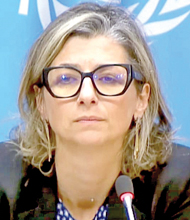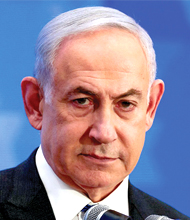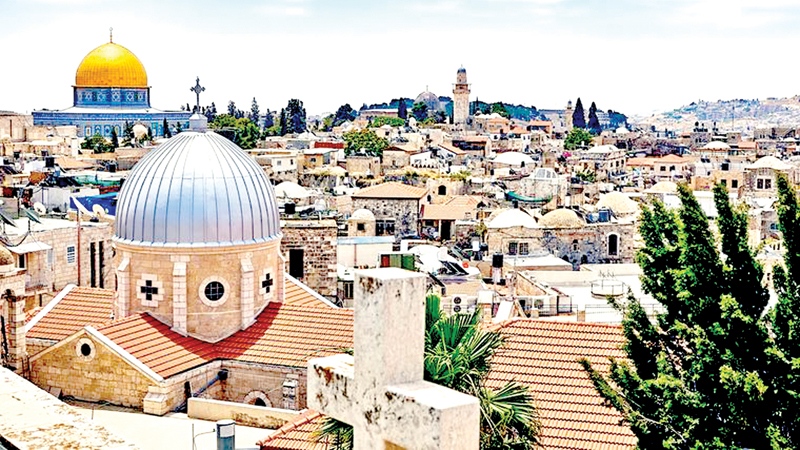 It is now ‘official’: Israel’s ongoing military operations in Gaza as well as its entire history of occupation of Palestinian territory has been found, by an UN-appointed expert investigator, to fit the description of the crime of genocide.
It is now ‘official’: Israel’s ongoing military operations in Gaza as well as its entire history of occupation of Palestinian territory has been found, by an UN-appointed expert investigator, to fit the description of the crime of genocide.
Equally serious, the meticulously formulated report by UN Special Rapporteur on Human Rights in Palestine, Dr. Francesca Albanese, warns that there are other states that “have been complicit in the Gaza Genocide.” But this Italian international lawyer with a wealth of rights monitoring experience does not name any “complicit” States.
The UN pronouncement on genocide being committed in what is the “Holy Land” for three world religions, grimly echoes that Land’s ancient ambience of the Passion of Jesus Christ. In this Holy Week, Christians devoutly remember His crucifixion under Roman imperial occupation, instigated by elite sections of the subjugated Palestinian populace of the time, and, finally, celebrate His glorious resurrection on Easter Sunday, today.
Reports from currently occupied Palestine indicate a (suitably) gloomy celebration of the climax of Jesus’ life. Ominously prominent in news visuals of the traditional procession of the cross are heavily armed Israeli troopers making up the sole audience along the locked-down, impoverished, streets of Old Jerusalem that are the Way of the Cross today.
The Palestinian Christian communities (Eastern Orthodox, Roman Catholic, Protestant, Coptic, Nestorian and other sects) usually throng those ancient cobbled streets along with crowds of foreign pilgrims from across the world. This Holy Week is, however, under a strict counter-insurgency blanket.

Dr. Francesca Albanese

Benjamin Netanyahu
Parallel to this restricted, token, Holy Week, the Israeli Jews freely celebrated their even more ancient ‘Passover’ festival across the country as usual. Most Jewish families now miss their young women and men who have been mobilised in the Israeli Defence Forces (IDF) and are at war with the indigenous Palestinians whose homeland they have forcibly converted into Israel over the past seventy-five years.
Still, in all the Israeli Jewish cities (some with minority Arab neighbourhoods) there were the usual ‘Seder’ celebratory feasts. Given the immense popular support for the ongoing war among Israeli Jews, the Passover services would have resounded with prayers for military victory. The Passover is the mythical event that launched the (equally mythical) Exodus, the mass escape of the ‘Israelites’, from oppression in Egypt.
The Exodus legend narrates this escape of a set of migratory tribes. Some ultranationalist Ashkenazi (European) Israeli Jews will claim descent from these ‘Twelve Tribes’. However, modern Israeli, Egyptian and Palestinian archaeology considers the Exodus (i.e. escape from Egypt) as pure myth. In fact, modern archaeological research in Israel-Palestine also cannot find any evidence of any invasion by those ‘Twelve Tribes’ after escaping Egypt.
In Old Jerusalem, there is no social celebration. The Christian pilgrim groups are absent. So are the local shopkeepers and the residents of the ‘Arab quarter’. Reportedly, the Israeli occupation authorities have allowed only a select 200 Palestinian Christian community leaders to enter the sacred sites. The traditional rituals marking that ancient, climactic, spiritual event are being conducted by these few clergy and lay officers minus their congregations this year.
The holiness of the Holy Land this Easter is not only the usual fervent memorialising of ancient events. Instead, the sacrality of the ancient Divine agony is emphatically, traumatically, physically, validated in real time by the intense cruelties of today’s ongoing ‘Agony of Jesus’ incarnate in the suffering Palestinian people.
The usual congregations, pilgrims and tourists are not there in Old Jerusalem to witness and participate in the symbolic rituals of the passion and agony of the Christ. They do not need to be there. Instead, the whole world community, in every corner of the Earth, is now watching the real-life, physical, agony of Palestinians and their passion to survive their real-life, ongoing crucifixion in the devastation of Gaza.
Is this a contemporary parallel climactic moment of imperial occupation – not ancient Roman but Western Colonial – a turning point in the life of another empire? After all, the Christianity founded by Jesus, just three centuries later, was instrumental in the beginnings of the gradual decline of Rome; in the religious coalescing with the pinnacle of the imperium; its ideological dilution of the structures of domination, later aiding in its territorial disintegration.
The UN Rapporteur’s report shines forth through the dark horrors of mass bloodshed. The Albanese Report is not a sword of violent jurisdiction but a ploughshare preparing the global human field for the crop-blessing of a future peace and justice; an ending of the current dominance of Western neo-colonialism.
Military offensive
The Report, formally submitted last week to the UN Human Rights Council (UNHRC) now in session in Geneva, forensically examines the execution of the military offensive against Gaza along with the political pronouncements by the Israeli Government and related officials. It presents detailed evidence in support of its conclusion of ‘genocidal intent’. As its pithy short title, ‘Anatomy of a Genocide’ indicates, it is a historic, commendably analytical, detailed report.
Alongside the Report comes the UN Security Council’s historic resolution last Monday “demanding” an “immediate” month-long ceasefire in Gaza; a formal direction by the Council, made after three previous failed attempts.
Such formal directives by the UNSC are fully enforceable – that is, if the Council chooses to enforce them. There are many instances when the UN subsequently did not follow up with such an enforcement either because enforcement measures were blocked by veto by one or more of the five ‘Permanent Members’ or, because the Council did not focus its attention on any such non-compliance.
There are also instances where the Council has authorised enforcement measures, including military interventions, in support of directives addressing crisis situations. After Monday’s positive vote – with no one opposing and just one abstention, by the USA – Palestine’s ambassador to the UN welcomed the ceasefire directive and stressed that the Council should use its powers to enforce it.
However, there is no serious optimism that either the major perpetrator of war, Israel, will obey the UN diktat or that the Western powers would allow the world body to follow-up with any ‘enforcement’. Analysts note that the Council Resolution, while demanding an immediate ceasefire, also demands a parallel release of all hostages. Even if there is no mention of Hamas and its allies in this connection, the practice so far has been that such hostage releases are always bilateral – i.e. there are simultaneous negotiations about, and exchange of hostages, from the Palestinian side and also the Israeli side.
Hostage exchange
At present Israel has been stalling ongoing hostage exchange negotiations hosted by Qatar. Thus, it will be easy for Israel to refuse to halt its military offensive – now formally labelled ‘genocidal’ –on the basis that the corollary UNSC demand for release of hostages is yet to happen. Indeed, the Likud-led Coalition Government has summarily rejected the ceasefire resolution by the Council.
Nevertheless, the official, legal directive by the world governing body (however weak and divided it may be) is now in place, requiring both compliance and enforcement. Even in other, comparable, world crisis situations like Apartheid South Africa and White Racist Rhodesia (now Zimbabwe), such UN directives became valuable building blocks for resolving those crises.
Meanwhile, the ‘liberal’ tone of India’s forthcoming elections has been marred by the sudden, illiberal, crackdown on major Opposition political parties and leaders barely a fortnight before voting begins in the world’s biggest capitalist democracy. While opinion polls place the ruling Bharatiya Janatha Party (BJP)-led coalition comfortably in the lead overall, inexplicably, some key Opposition forces now find themselves faced with sudden, unexpected setbacks to their electioneering.
Indian public opinion, already in heated debate over major Opposition figure Rahul Gandhi’s brief suspension from his Lok Sabha seat last year over a minor court ruling, is now boiling over the recent detention of yet another political idol – the anti-corruption hero Arvind Kejriwal – also on seemingly flimsy charges.
Likewise, the Indian National Congress Party, India’s ‘mother of all parties’, has suddenly found its main bank accounts frozen since last month on a directive by the Inland Revenue authorities on the alleged failure by this venerable political institution to submit some tax returns several years ago.
Congress leaders accuse the BJP Government of attempting to cripple its major Opposition adversary just as the election campaigning was climaxing prior to next month’s General Election (GE).
Tax authorities
Indian Opposition leaders are now saying that the Government is using various regulatory agencies like the Police and the tax authorities to crackdown on Opposition forces that threaten the ruling party’s current stranglehold on the Indian democratic system.
Indeed, both Opposition political parties as well as civil rights groups are questioning whether the Hindu-Hindi majoritarian culture now being imposed by the BJP and its cultural nationalist support movements are undermining India’s secular republicanism as well as its pluralist democratic norms and practices.
Political observers wonder whether this sudden crackdown on opposition leaders and parties is a panic reaction by the ruling coalition in Delhi. Analysts wonder whether the incumbent BJP-NDA regime fears that the broad Congress-led alliance may actually whittle down the Government’s currently rock-solid Lok Sabha majority in the forthcoming GE.
Certainly, some regional opinion polls and political assessments indicate that while the incumbent regime will cling to power in the Lok Sabha, in some of the more prosperous non-Hindi-speaking states the Opposition coalition may edge out Modi loyalists.
South Asia is watching to see whether the frenzy of current ethnic majority communalism – as expressed in anti-Muslim virulence – will subside once the electioneering ends. The waves of hardline ethno-nationalist political energies being unleashed inside India as part of the election contest reflects negatively on India’s status as the regionally dominant State.
Ethno-religious hostilities aroused in India’s domestic politics also reflects in India’s inter-state relations with its fellow South Asian neighbours. There are many in our neighbourhood who would wish a strong, stable, democratic India would lead in creating stability in this, one of the world’s most populous, multi-cultural regions.




